#feb 1일 1포
Text

[1일 1포 - 14/28]
Collocations with 가다
v. to go
서울에/학교에 — 장소를 욺겨 움직이다 // Move to a place
관심이/정이/눈길이/호감이/신경이 — 관심이나 눈길이 특정한 대상에게 가다 // Be concerned about something
소식이/연락이/신호가 — 말이나 소식이 전해지다 (= 전달되다/전해지다) // Word or news goes out
겨울이/시간이/며칠이 — 시간이나 계철이 흐르거나 지나다 // Time or season goes by
손해가/이익이/피해가 — 어떤 일이 생기거나 일어나다 // Something happens
무리가/부담이/충격이 — 건강에 해가 되다 // Harmful to health
손이/손길이 — 어떤 일을 하는데 수고가 많이 들다 // Something requires much trouble to do
이해가/짐작이 — 어떤 일에 대해서 이해나 짐작이 되다 // Guess or understand something
젊은 나이에/비명에 — 사람이 죽다 (= 돌아가시다/죽다) // Die
Examples:
이번 주말에는 제주도에 간다.
그 사람은 말을 너무 차갑게 해서 정이 안 간다.
팀장님께 연락이 갔는지 확인해 보아야겠다.
시간이 갈수록 한국어 공부가 재미있어진다.
제품을 너무 싸게 팔아서 손해가 갔다.
넘어지면서 너무 겅하게 부딪혀서 머리에 충격이 갔다.
손이 많이 가는 요리를 하면 시간이 꽤 걸린다.
그 사람의 얼굴을 보면 얼마나 힘들게 살았는지 짐작이 간다.
젊은 나이에 간 찬구가 안타까웠다.
#langblr#studyblr#language learning#한국어#korean#collocations#vocabulary#korean language#한국어 공부#feb 1일 1포
16 notes
·
View notes
Text
[1일 1포 - 20/28]
This or That (Korean Food Edition)
You know how in English we ask this or that questions like chocolate or vanilla? crunchy peanut butter or smooth?
Here are some common ones in Korean~
부먹 vs 찍먹
When eating 탕수육 (sweet & sour pork), how do you eat the sauce?
부어 먹다 = pour on top then eat
찍어 먹다 = dip each piece in the sauce & eat
짜장 vs 짬뽕
What do you order at a Chinese restaurant?
짜장면 = black bean noodle dish
짬뽕 = spicy seafood noodle soup
물냉 vs 비냉
How do you like your cold noodles (often eaten in the summer and after k-bbq)?
물냉면 = cold noodle soup
비빔냉면 = spicy cold noodles (with less/no broth)
완숙 vs 반숙
How do you like your eggs?
완숙 = hard boiled (or yolk fully cooked, if frying)
반숙 = soft boiled (or soft yolk, if frying)
팥붕 vs 슈붕
Which filling do you prefer in your fish-shaped bread?
팥 붕어빵 = fish shaped bread w/ red bean filling
슈크림 붕어빵 = fish shaped bread w/ cream filling
밀떡 vs 쌀떡
When eating 떡볶이 (spicy stir-fried rice cakes), which type of 떡 (rice cake) do you prefer?
밀가루 떡볶이 = wheat flour 떡
쌀 떡볶이 = rice 떡
A similar concept/phrase is 호불호 갈리는 음식/음료
호불호 = "like & dislike"
갈리다 = divide
So it means foods/drinks that people are divided over, as in you either like it or hate it. The #1 호불호 갈리는 음식 in America would probably be pineapple on pizza. A big one in Korea is 민트초코.
Which side are you on?? I'm 찍먹/짜장/물냉/반숙/슈붕/쌀떡 (and I love 민트초코~)
#langblr#language learning#foreign language#korean language#korean langblr#learn korean#Korean food#vocabulary#feb 1일 1포
15 notes
·
View notes
Text
[1일 1포 - 10/28]
New book alert~ I had to go to the mall for an errand and couldn't resist stopping by the book store... I'd never seen this book before but I'm very excited about it: 유학생을 위한 한국어 연어학습사전 (Learner's Dictionary of Korean Collocation)
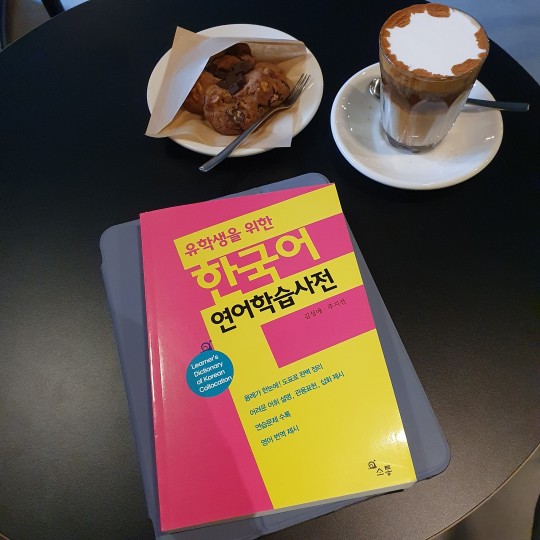
If you don't know what a collocation is, it's (in linguistics) a common/predictable combination of words. They're a helpful thing to study in your target language because they're often different across languages! And a lot of collocations can be considered idiomatic expressions, so the meaning might not be clear if you only know the words individually.
For example, in English we say:
take a test
take a nap
take a photo
take the subway
take medicine
take care of (someone/thing)
But in Korean, these use totally different verbs:
시험을 보다
낮잠을 자다
사진을 찍다
지하철을 타다
약을 먹다
(누구) 돌보다
This is the kind of thing you'll absolutely encounter through regular study materials + the real world, but the way this book lays out this info is very satisfying~ I think this will be a fun way to study some vocab :)
12 notes
·
View notes
Text
[1일 1 포 - 18/28]
My friend used this phrase in a story and said it’s a well known idiom!
버선발로 마중나오다/나가다/만나러 가다
내가 집에가면 고양이가 항상 버선발로 마중나온다.*
버선 = traditional socks worn with hanbok [한복 = traditional clothing]
발 = foot/feet; in this context, 버선발 are feet wearing 버선
마중나오다 = to come out to meet (someone)
나가다 = to go out
만나러 가다 = to go to meet
Meaning: being so excited/surprised the person goes/comes out wearing just their socks
*This example is from my friend, but it’s not a normal sentence because people don’t think of their cats wearing shoes/socks lol …my friend thought the mental image of my cat running to greet me was so cute and matched the idea behind the idiom, even if it’s normally used for people
14 notes
·
View notes
Text
[1일 1포 - 7/28]
My school gave me ₩50,000 for my birthday, but it's in this gift certificate form instead of cash
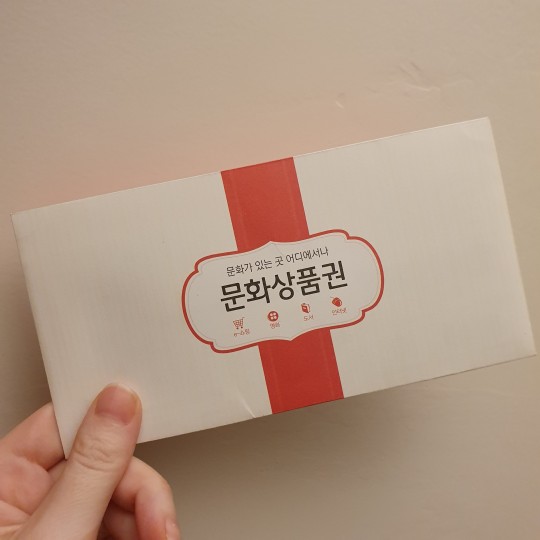
어휘
문화상품권 - gift certificate/voucher
문화 - culture
있다 - to exist, to have
곳 - place
어디 - where
문화가 있는 곳 어디에서나 - wherever there's culture
e-쇼핑 - literally "e-shopping" as in online shopping
영화 - movies
도서 - books
인터넷 - internet
#langblr#studyblr#language learning#korean#한국어#vocabulary#living in korea#learn korean#korean in the wild#feb 1일 1포
19 notes
·
View notes
Text
[1일 1포 - 27/28]
Saw this example of non-standard Korean spelling in the wild!
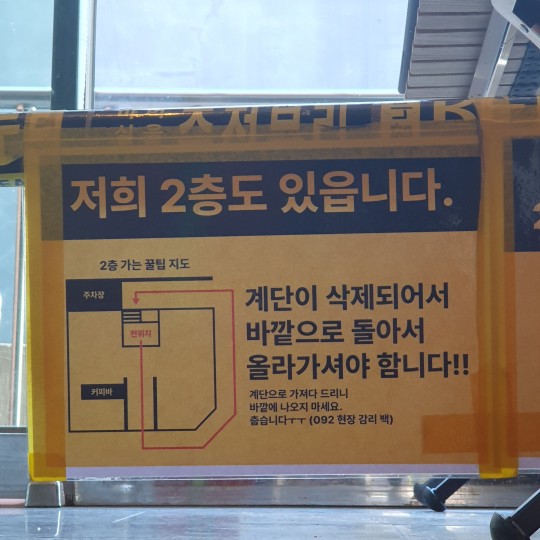
-읍니다 used to be accepted back in the day, before the official 표준어 rules were made
-ㅁ니다 is how -ㅂ니다 is pronounced, but it's not the proper spelling (I'm not sure what kinda feeling this phonetic spelling conveys, but it might be something because this isn't the first time I've seen 함니다 in the wild...)
#langblr#studyblr#language learning#korean#한국어#korean language#learning in the wild#feb 1일 1포#spelling#한글#한국어 공부
8 notes
·
View notes
Text
[1일 1포 - 26/28]
Heard someone use the phrase 오리발 (duck feet) and I understood the meaning from context, but hadn't heard the proverb before!
닭 잡아먹고 오리발 내민다
Literally: slaughter & eat a chicken and hold out duck feet.
Meaning: to pretend you're innocent (especially in a way that's awkward or obviously a lie)
The story behind it is that a guy took & ate someone else's chicken, and then when the chicken's owner asked him "um did you eat my chicken?" he said "no...I ate a duck, look at these duck feet."
Basically, it's for calling out someone who's playing dumb and pretending they didn't do something when they did do it.
닭 - chicken
잡아먹다 - to prey on, slaughter, butcher and eat; from 잡다 (to catch) + 먹다 (to eat)
오리발 - duck feet; also flippers for swimming
내밀다 - to hold out, stick out, extend (like holding out your hand or extending your neck...that kind of action) [*it's 내민다 in the proverb because it's in narrative form]
youtube
Related vocab:
시치미를 떼다 - to feign innocence
모르쇠 - playing dumb
#한국어#korean language#langblr#studyblr#language learning#proverbs#속담#vocabulary#listening practice#feb 1일 1포#korean langblr#Youtube
9 notes
·
View notes
Text
[1일 1포 - 19/28]
야자타임
This is a sort of "game" where everyone drops formalities and uses 반말 (informal speech uses "야", "자" endings, hence 야자-time).
So during 야자타임, instead of calling someone ㅇㅇ 씨, 선배님, 쌤... you'd just call them ㅇㅇ아, 야, 너 and drop the 요/습니다 endings.
It's usually done while drinking, but it also comes up on variety shows and things like that because it's funny to break the social hierarchy sometimes. But if you play it with people you usually speak formally to, try not to get carried away because some people might hold a grudge if they felt you were too rude ㅋㅋ
I was reminded of this game cause I saw this trailer for a new youtube show called 야자타임 with some male celebrities. (Seems like the first 2 episodes are out, if you're looking for some unscripted listening practice!)
youtube
#langblr#listening practice#language learning#studyblr#Korean#존댓말#반말#korean language#study Korean#feb 1일 1포
8 notes
·
View notes
Text
[1일 1포 - 25/28]
Went to a union meeting today, so here are some words more or less related (in my mind, at least)
노동조합 (노조) - labor union
전국민주노동조합총연맹 (민주노총) - Korean Confederation of Trade Unions (KCTU) [this one is more left-leaning]
한국노동조합총연맹 (한국노총) - Federation of Korean Trade Unions (FKTU) [this one is more right-leaning]
노동자, 근로자 - worker
조합비 - union dues
강령 - a creed, doctrine
(총)파업 - (general) strike
시위 - protest, demonstration
선언하다 - to declare, proclaim
연대하다 - to be in solidarity, unity
인권 - human rights
최저임금 - minimum wage [currently 9,620원 = $7.31]
근로자의 날 (5월 1일) - Labor Day, Workers' Day (May 1st)
민주주의 - democracy
자본주의 - capitalism
사회주의 - socialism
공산주의 - communism
And these are the political parties that are generally supportive of the KCTU: 진보당 (Progressive Party), 노동당 (Labor Party), 정의당 (Justice Party), 녹색당 (Green Party)
#langblr#studyblr#language learning#korean#Korean language#there is power in a union#politics#vocabulary#korean vocabulary#korean langblr#feb 1일 1포
8 notes
·
View notes
Text
[1일 1포 - 2/28]
Found some old handwritten flashcards I made in KIIP level 5 and I've definitely forgotten 90% of that class...

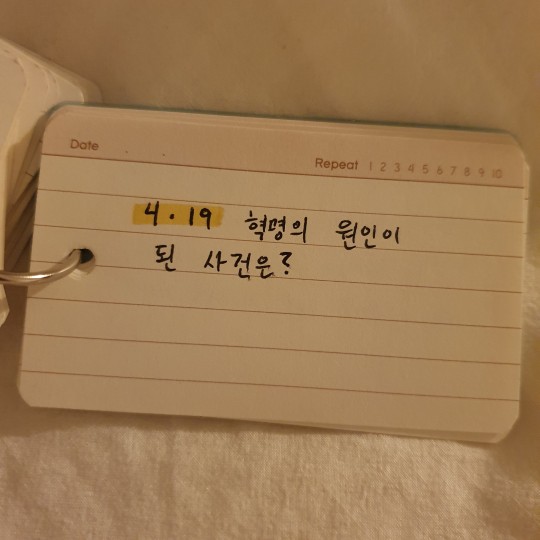
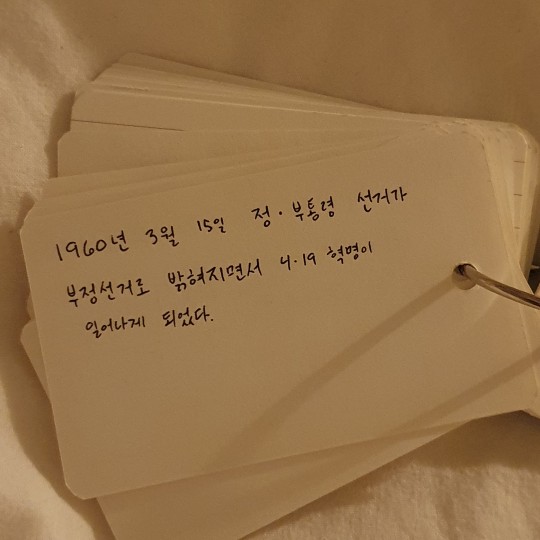
I remember really struggling to remember 산업재해보상보험 (industrial accident compensation insurance aka workers' comp.), but I immediately knew it when I saw that card just now!
Still don't remember all the historical dates, though, so I should go over those again~
#langblr#studyblr#language learning#korean#KIIP#사회통합프로그램#한국어#flashcards#korean language#learn Korean#feb 1일 1포
10 notes
·
View notes
Text
[1일 1포 - 6/28]
Saw this at a bus stop recently and was reminded of all the times my T-Money card didn't have enough money to cover my bus fare and I had to find a place to recharge it and wait for the next bus

교통카드잔액조회기
카드를 대주세요
교통카드를 대시면 잔액이 표시됩니다
어휘 // Vocab
교통카드 - transportation card (for bus/subway/taxi)
잔액 - balance (as in how much money is in a bank account)
조회 - inquiry
잔액 조회기 - balance checker/reader [기 is a common suffix for machines]
대다 - to touch something to something else
~아/어 주세요 - please do ___
~면 - if/when
표시되다 - to be indicated
(I now use my bank card as a transportation card and don't need to recharge it...but this is still a cool little machine that should be at more bus stops!)
#langblr#studyblr#language learning#korean#한국어#living in korea#vocabulary#korean in the wild#feb 1일 1포
7 notes
·
View notes
Text
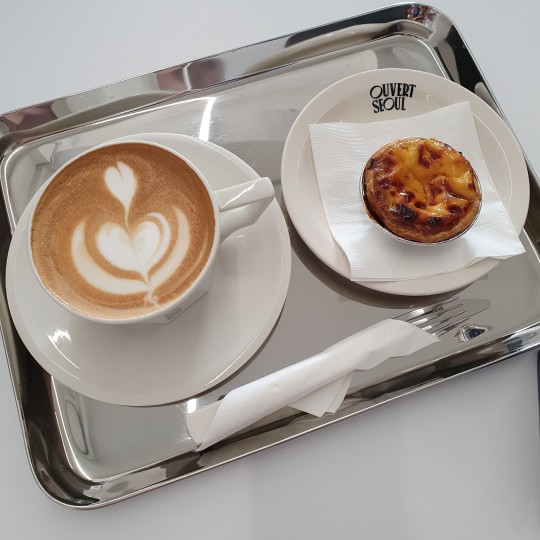
[1일 1포 - 4/28]
Sat at this nice cafe for 3 hours and got some work done~
9 notes
·
View notes
Text
[1일 1포 - 24/28]
Another grammar post before my vacation ends~
This is a common grammar that's not too difficult to use! Perfect for studying over the weekend~
#langblr#studyblr#language learning#korean#한국어#grammar#한국어 공부#Korean language#foreign language#learn Korean#feb 1일 1포
5 notes
·
View notes
Text
[1일 1포 - 21/28]
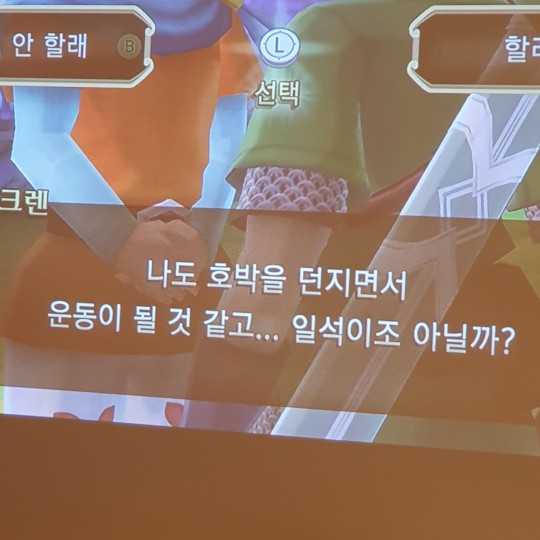
스위치의 언어 한국어로 설정한 걸 깜박했다 ㅎㅎ
5 notes
·
View notes
Text
[1일 1포 - 5/28]
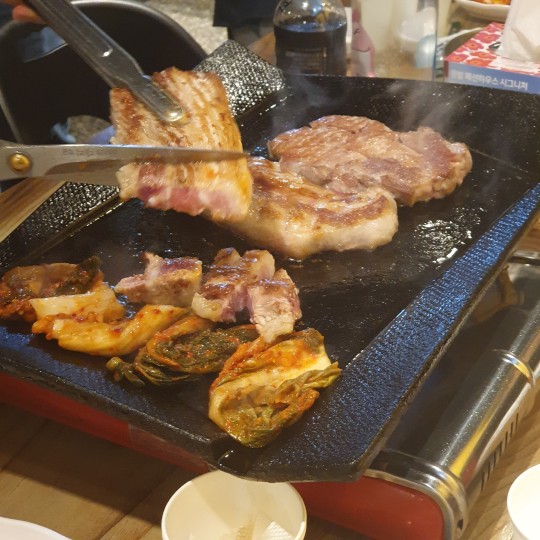
오늘 기분이 좀 안좋지만 뒷풀이 갔다
3 notes
·
View notes
Text
[1일 1포 - 28/28!]
Today (the 28th) was dance class registration day, which is always nerve-wrecking because you have to get your post ready and hit enter as soon as registration opens.
But earlier, in one of my group chats, someone asked a question I had just figured out for myself. Fluent speakers needing clarification always makes me feel better about my language skills ㅋㅋㅋ
ㄹ: 근데, [수업명] 신청때,
수강자격에맞는, 수강한 과목 적는건, 제목에 적어요? 내용에 적어요?
ㄹ: 수강신청 쫄보
ㅂ: 내용에 적는것같아요!
ㅇ: 내용입니다
ㅇ: 본문기재
3 notes
·
View notes